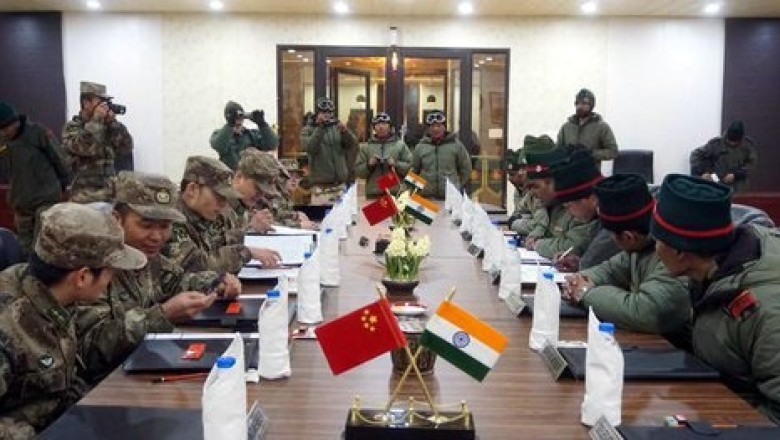
views
India and China to Resume Border Dialogue in Beijing After Five-Year Gap
India and China are set to hold their Special Representatives (SR) meeting on border issues in Beijing on December 18, a significant development after a hiatus of five years. This resumption of dialogue marks a crucial step towards managing the long-standing and often contentious border disputes between the two Asian giants. The announcement was made by India's Ministry of External Affairs (MEA), highlighting the eagerness of both nations to improve bilateral ties.
The forthcoming dialogue will be led by India's National Security Advisor Ajit Doval and his Chinese counterpart, Wang Yi. This meeting holds particular importance as the last SR dialogue was conducted in New Delhi back in December 2019. The gap in such high-level discussions has been filled with a series of skirmishes and stand-offs along the Line of Actual Control (LAC) in eastern Ladakh, severely straining the relationship between the two countries.
The MEA’s announcement came late on Monday, emphasizing the primary agenda of the talks – to discuss the management of peace and tranquility in the border regions and to explore a "fair, reasonable and mutually acceptable" solution to the boundary question. The decision to revive the SR dialogue mechanism was taken during a meeting between Indian Prime Minister Narendra Modi and Chinese President Xi Jinping in Kazan on October 23. This meeting occurred two days after both countries finalized an agreement for disengagement in the eastern Ladakh regions of Demchok and Depsang.
The military standoff along the LAC began in May 2020 and escalated into a deadly clash at the Galwan Valley in June of the same year, resulting in significant casualties on both sides. This clash marked the first such deadly encounter in decades and pushed bilateral relations to their lowest point in years. The disengagement process, completed recently, has effectively ended the face-off at the last two friction points under the October 21 agreement, paving the way for the resumption of talks.
The 23rd meeting of the SRs will take place in Beijing, and it is expected to address the critical issues that have kept the two nations at loggerheads. Both Doval and Wang Yi hold significant positions in their respective governments, with Doval being a key figure in India’s national security framework and Wang Yi a prominent member of the Political Bureau of the Communist Party of China (CPC) Central Committee and China’s Minister of Foreign Affairs.
The discussions are expected to be comprehensive, addressing both immediate and long-term measures to ensure peace along the border. This will include exploring new frameworks for border management, confidence-building measures, and potentially setting the stage for more permanent solutions to the boundary disputes that have plagued India-China relations for decades.
In recent times, both countries have shown a willingness to improve relations, albeit cautiously. The disengagement at Demchok and Depsang is seen as a positive step towards reducing military tensions. However, the road to normalcy is fraught with challenges, given the complex and often volatile nature of the border issues.
The significance of the SR meeting cannot be overstated. It represents not just a thaw in the frosty relations but also a mutual acknowledgment of the need for dialogue and diplomacy in resolving complex issues. The outcome of the meeting will likely set the tone for future engagements and could influence the broader geopolitical dynamics in the region.
India and China share a long and contested border, stretching over 3,488 kilometers, from the Ladakh region in the north to the eastern Indian state of Arunachal Pradesh. The lack of a demarcated boundary has often led to misunderstandings and confrontations, with both sides accusing each other of transgressions.
The strategic significance of these border regions adds another layer of complexity to the dispute. For India, the security of its northern frontier is paramount, while for China, the stability of its western periphery is crucial for its national security and regional influence. The areas of contention, particularly in eastern Ladakh, have seen significant military build-up and infrastructure development by both sides.
As both countries prepare for the SR dialogue, there is cautious optimism about the potential for meaningful progress. The engagement is expected to build on the recent agreements and explore further steps to enhance mutual trust and cooperation. The international community will be closely watching the developments, given the broader implications for regional stability and security.
The meeting between Doval and Wang Yi also underscores the importance of direct communication channels in addressing bilateral issues. The SR mechanism has traditionally been a platform for high-level discussions on the border issues, allowing both sides to articulate their concerns and explore potential solutions. The revival of this mechanism after a five-year gap is a positive development and indicates a renewed commitment to dialogue and peaceful resolution of disputes.
While the immediate focus will be on managing the current border situation, the broader objective remains the resolution of the boundary issue. Both countries recognize that peace and tranquility along the border are essential for the overall development of bilateral relations. The SR dialogue is a step in this direction, aiming to create a conducive environment for more substantive and long-term solutions.
In conclusion, the upcoming SR meeting in Beijing is a significant event in the context of India-China relations. It represents a critical opportunity to address long-standing issues, reduce tensions, and pave the way for a more stable and cooperative relationship. The international community will keenly follow the outcomes, hoping for positive developments that contribute to regional and global peace.












Comments
0 comment